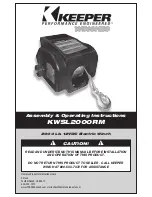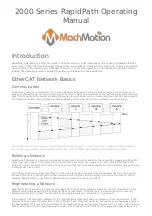
1. Keep hands, clothing, hair and jewelry clear of the drum area and cable when winching.
2. Never use the winch if the cable is frayed, kinked or damaged.
3. Never allow anyone to stand near the cable or in line with the cable behind the winch while it is under
power. If the cable should slip or break, it can suddenly whip back towards the winch, causing a
hazard for anyone in the area. Always stand well to the side while winching.
1. This winch has a capacity of 2,000 lbs. Applying this measurement to practical applications, you can
use this winch to move the following:
a. Move a load from a dead stop of up to 2,000 lbs., on level ground.
b. Move a water craft of up to 5,000 lbs. and up to 18’ long.
c. Maintain movement of a pneumatic tired rolling load of up to 6,000 lbs.
2. Pulling Capacity is reduced as incline increases. For example, rolling capacity is reduced from 6,000
lbs. on fl at ground to 1,100 lbs. on a 45° incline. Please refer to the following chart for estimated pull-
ing capacity (rolling weight) on various inclines.
Degree of Incline
1. Turn the clutch knob clockwise until hand tight.
Do not force it or over tighten.
2. Place the end of the hand crank over the fl at-
tened end of threaded shaft on the left side of
the winch
(Figure 13)
.
3. Rotate the hand crank clockwise to tighten
the cable. Continue to turn until the cable has
been completely retracted.
!
!
WARNING
PULLING CAPACITY
Maximum (Rolling) Weight Capacities on an Incline
Using the Emergency Hand Crank
!
!
WARNING
Do Not Use the crank to assist an operating winch. This
will damage the winch and may cause personal injury.
9
FIGURE 13
(+)
7000 lb
6000 lb
5000 lb
4000 lb
3000 lb
2000 lb
1000 lb
0 lb
10
20
30
40
50
Max. Weight Capacities
on an incline
Summary of Contents for KWSL2000RM
Page 31: ...Notes Notas...










































